Key takeaways:
- Eco-friendly brands prioritize sustainability, ethical labor, and transparency in their production processes, creating a meaningful connection with consumers.
- Sustainable fashion promotes longevity and mindful consumption, encouraging individuals to invest in high-quality pieces that reflect their values.
- Feminist fashion emphasizes empowerment, inclusivity, and environmental sustainability, advocating for ethical labor practices within the fashion industry.
- Key criteria for selecting eco-friendly brands include sustainable materials, transparent supply chains, and positive impacts on communities and the environment.
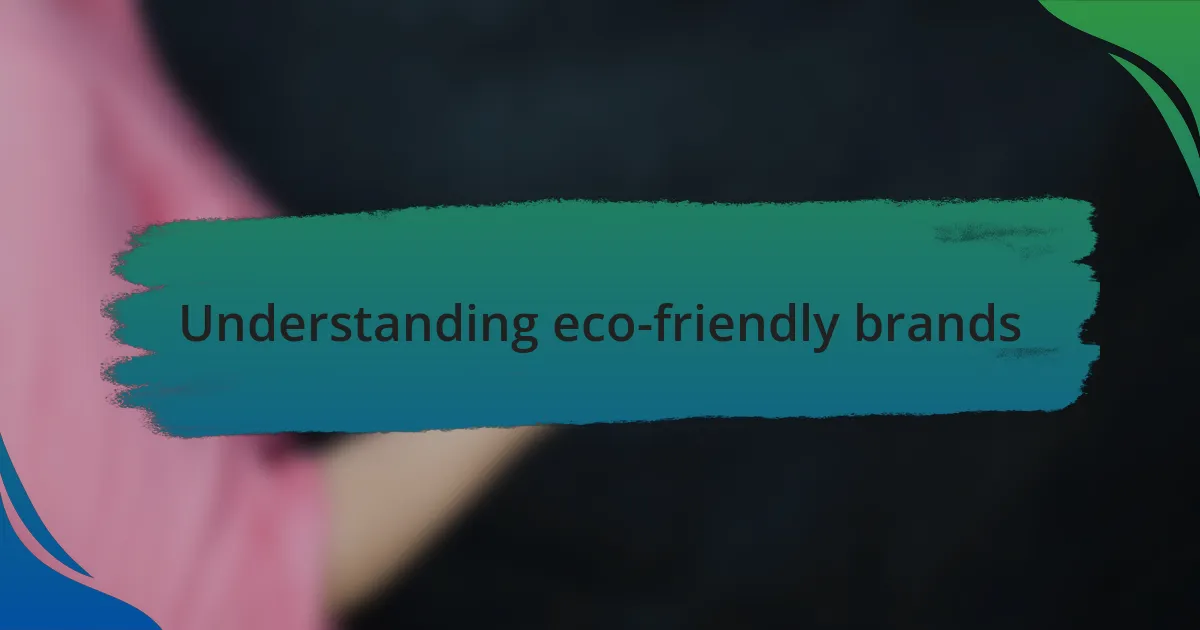
Understanding eco-friendly brands
Understanding eco-friendly brands means delving into the values that drive them. I remember the first time I discovered a brand that prioritized sustainability over fast fashion. It felt revolutionary, almost like finding a hidden treasure, as it aligned with my personal values.
These brands often utilize sustainable materials and ethical labor practices, showing that fashion can be both stylish and responsible. When I see a label that highlights organic cotton or recycled materials, I feel a sense of connection to the product. Isn’t it comforting to know that my purchasing decisions can support both creativity and the planet’s well-being?
Moreover, the transparency of these brands plays a critical role in their appeal. I’ve found myself drawn to companies that openly share their production processes. It’s like unearthing a story behind each piece I wear, making me wonder about the journey the fabric took before it became part of my wardrobe. How empowering is it to wear clothing that not only looks good but also feels good for the world?
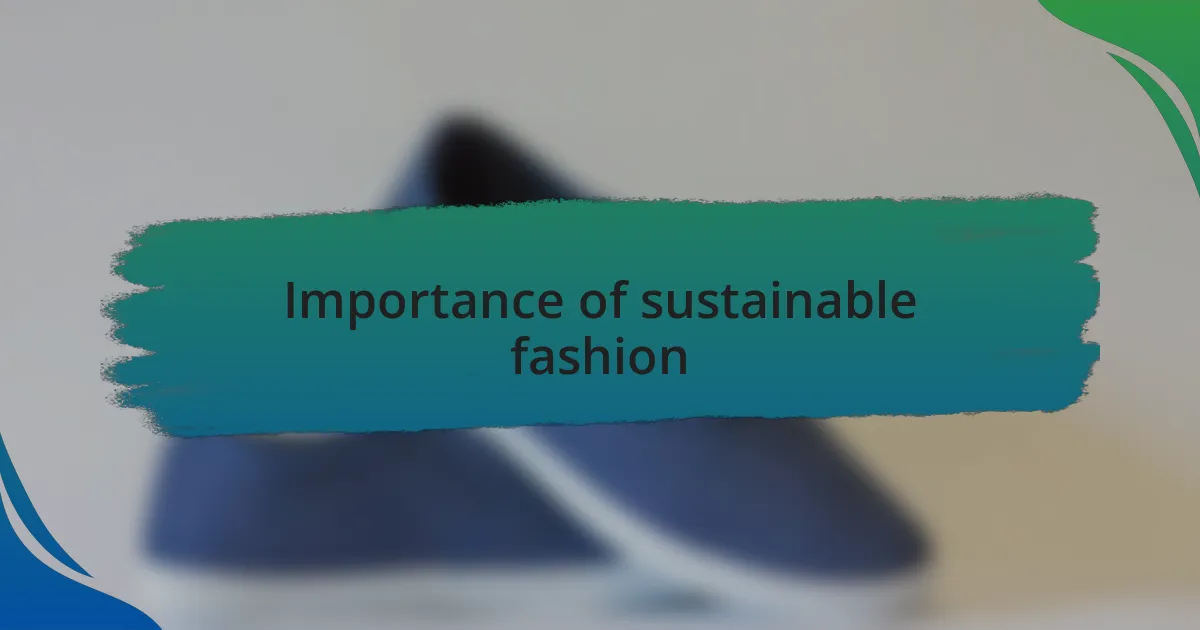
Importance of sustainable fashion
Sustainable fashion is essential because it challenges the fast fashion norm that prioritizes profit over the planet. I recall a time when I bought a beautifully crafted dress from a brand committed to sustainable practices. Wearing it, I didn’t just feel beautiful; I felt proud to support a brand that cared for the environment and its workers. Isn’t it empowering to know that your choice can make a real difference?
Moreover, sustainable fashion promotes a culture of longevity and mindfulness in our wardrobes. Instead of buying countless pieces that I might only wear once, I’ve started investing in high-quality items that I cherish. Each piece tells a story, inviting me to think carefully about my choices and their impact. Have you ever stopped to consider the journey of the clothes you wear daily?
Finally, embracing sustainable fashion fosters a community of like-minded individuals who value ethical consumption. I’ve noticed that my social circles have shifted; my friends and I often share our favorite eco-friendly brands and discuss their stories. It feels refreshing to connect over our shared commitment to a more sustainable future. Isn’t it inspiring how fashion can unite us in such a meaningful way?
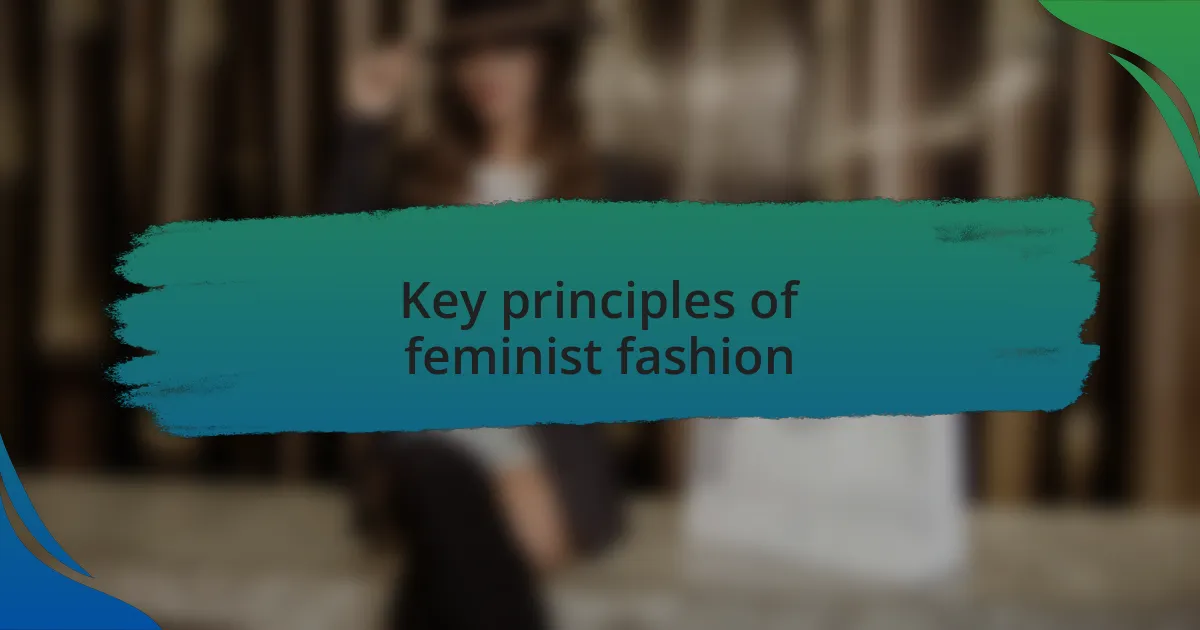
Key principles of feminist fashion
Feminist fashion centers around empowerment, ensuring that all individuals can express themselves freely through their clothing choices. I’ve experienced the thrill of discovering brands that not only celebrate diverse body types but also prioritize inclusive designs. It really made me reflect: how often do our wardrobe choices truly represent who we are?
Another key principle is the focus on ethical labor practices. When I learned that some brands pay living wages and create safe working conditions, it shifted my entire perspective on consumer responsibility. It made me wonder, don’t we all deserve to know that the clothes we wear are made under fair conditions?
Lastly, feminist fashion advocates for environmental sustainability as a vital aspect of social equality. I vividly recall a time when I chose a sustainably made garment over a trendy fast fashion piece. That choice became more than just a purchase; it was a statement about caring for our planet and its inhabitants. Have you considered how your fashion choices can echo your values?
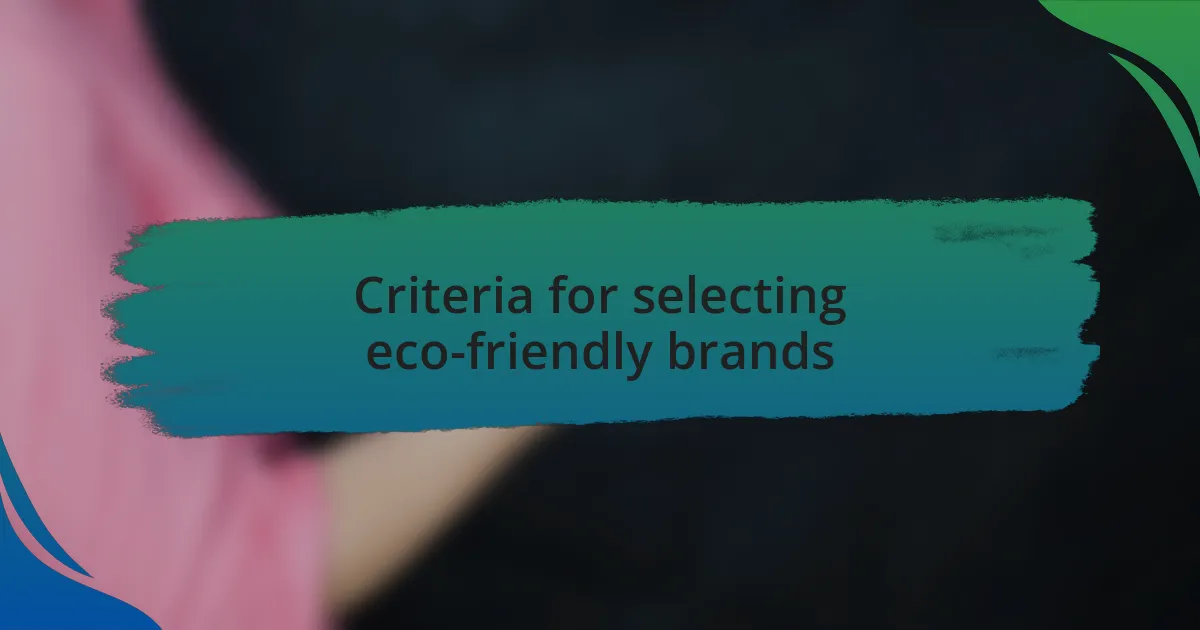
Criteria for selecting eco-friendly brands
When selecting eco-friendly brands, I often start by examining their material sources. The transition to organic, renewable, or recycled materials gives me peace of mind, knowing that my choices help reduce waste and minimize the carbon footprint. I remember the first time I held a shirt made from bamboo fabric—it felt so soft and luxurious, but it also resonated with my values about sustainable living.
Another crucial criterion for me is the transparency of the brand’s supply chain. I look for companies that openly share where and how their products are made. It’s incredibly satisfying to support a brand that takes pride in its ethical practices. I once stumbled upon a small label that not only disclosed their factory locations but also encouraged workers to share their stories. That connection made me feel more than just a consumer; I felt part of a community with shared ideals.
Lastly, I consider the brand’s overall impact on the environment and local communities. Are they involved in any initiatives that give back to the planet or the people who help make their products? I recall being inspired by a company that planted a tree for every item sold. It reminded me that every purchase could contribute positively—to the world and to the lives of others. What about you? Have you thought about the broader impact of your fashion choices?

Personal experiences with eco-friendly brands
When I first discovered an eco-friendly jewelry brand, I was both excited and a little skeptical. The handcrafted pieces were made from upcycled materials, and I found myself captivated by the story behind each item. Wearing a ring made from reclaimed silver felt like more than just a fashion statement; it was a conversation starter about sustainability and creativity.
I remember purchasing a pair of shoes from a company that focused on sustainable practices. The moment I slipped them on, I felt an immediate connection—not only because they were comfortable, but because each pair was crafted with care for the environment and fair labor practices. It’s that sense of responsibility woven into the fabric of the brand that reminds me why my choices matter, even in fashion. Have you ever felt that connection with a specific item in your wardrobe?
During a recent trip, I visited a thrift store that supported local charities. Each purchase felt like a double win: I was scoring unique finds while contributing to a greater cause. The thrill of unearthing a vintage dress that had its own history was indescribable, transforming my shopping experience into a meaningful journey that aligned with my values in so many ways. Has your experience with second-hand shopping ever felt this rewarding?
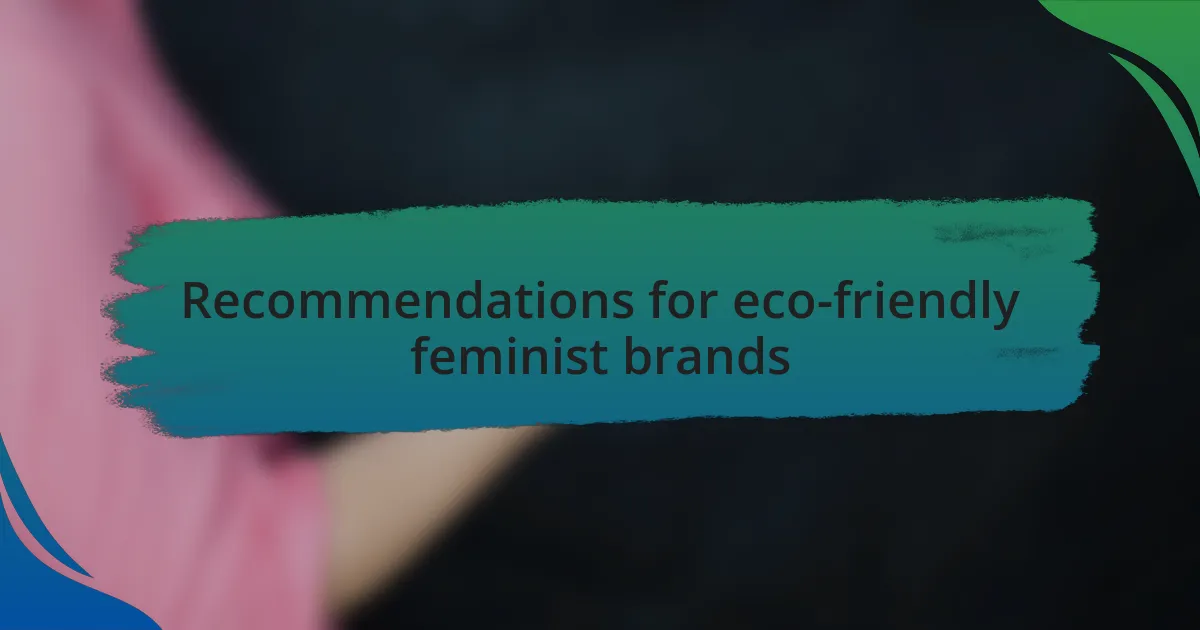
Recommendations for eco-friendly feminist brands
One brand that truly resonates with me is Reformation. Their commitment to sustainability is not just a marketing gimmick; it’s ingrained in every piece they create. When I purchased a dress from them, I was struck by how stylish it was while still being made with eco-friendly materials. Have you ever experienced the joy of finding a fashionable piece that aligns with your values?
Another noteworthy mention is Patagonia, which stands out not only for its durable outdoor apparel but also for its strong advocacy for environmental causes. I remember wearing their jacket during an outdoor gathering, feeling confident knowing that its production prioritized ethical practices. It’s empowering to support a brand that actively engages in activism—can fashion be a force for social change?
Lastly, I’ve come across TOMS, known for its One for One program. Each time I wear their shoes, I think about the positive impact my purchase has on someone else’s life. This brand exemplifies how consumer choices can foster a sense of community and support. Have you considered how your shopping habits can effect change beyond your wardrobe?